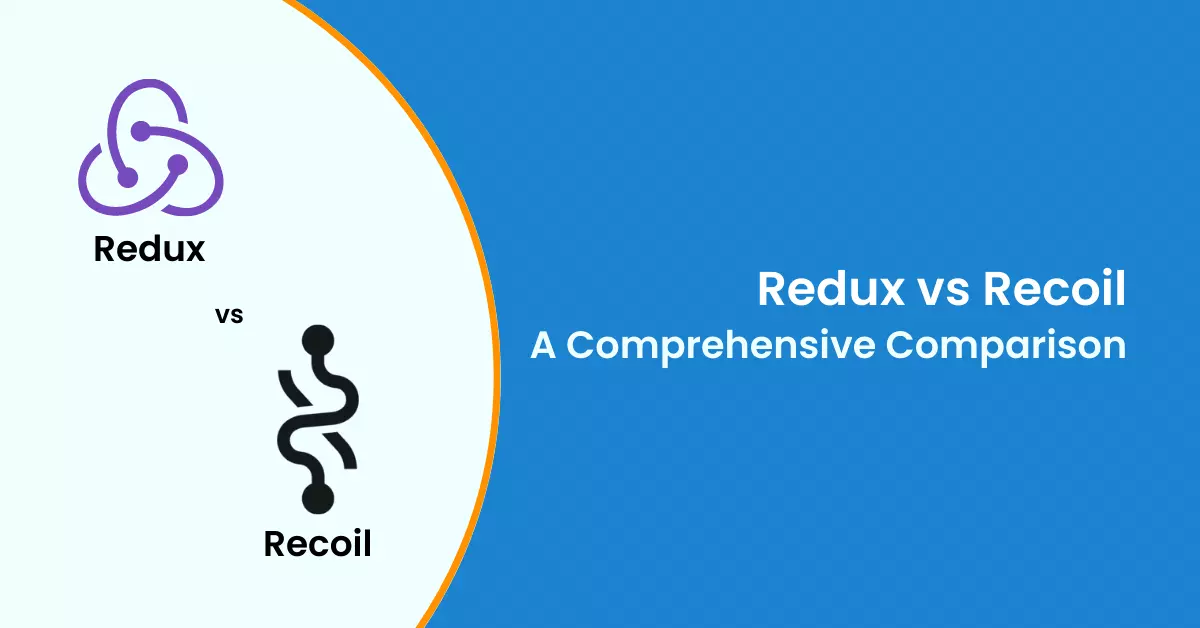Redux vs Recoil: A Comprehensive Comparison

In today’s fast-evolving world of web development, managing state effectively is crucial for creating seamless, interactive user experiences. As React applications grow in complexity, selecting the right state management library becomes a vital decision. Two popular choices in this domain that come to comparison are Redux vs Recoil. This comprehensive comparison will delve into the core features, strengths, and differences of Redux and Recoil, helping you determine which library best suits the unique requirements of your project.
Redux
Redux is a state management library that has been around since 2015. It was created by Dan Abramov and Andrew Clark and has since become one of the most popular choices for managing state in React applications. Redux uses a centralized store to hold the application’s state, which can be accessed and modified using actions and reducers.
One of the advantages of Redux is its predictability. Since all changes to the state happen through actions, it’s easier to track and debug changes to the state. Redux also allows for easy integration with other libraries and tools, such as React Router and DevTools.
However, Redux can be difficult to set up and can require a lot of boilerplate code. This can make it difficult for smaller projects or for developers who are new to Redux. Additionally, Redux’s reliance on immutability can make it difficult to work with mutable data structures.
Pros and Cons of Redux
Pros
1) Predictable state management: Redux provides a predictable state management system, which means that the state of an application can be easily traced and debugged.
2) Centralized storage: Redux provides a centralized storage for managing the state, which means that all of the application’s state is stored in a single location.
3) Separation of concerns: Redux encourages separation of concerns, which means that the code related to state management can be kept separate from other parts of the application.
4) Easy testing: Since Redux separates state management from the rest of the application, it is easy to test the state management code in isolation.
5) Community support: Redux has a large and active community, which means that it is well-documented and there are many resources available for learning and problem-solving.
Cons
1) Complexity: Redux can be complex to learn and use, particularly for small applications that don’t require a lot of state management.
2) Boilerplate code: Redux requires a lot of boilerplate code, which means that it can be time-consuming to set up and maintain.
3) Overkill for small projects: For small projects that don’t require a lot of state management, using Redux can be overkill and add unnecessary complexity.
4) Steep learning curve: Learning Redux can be challenging, particularly for developers who are new to the concept of state management.
5) Debugging can be difficult: Debugging in Redux can be difficult, particularly for developers who are not familiar with the Redux architecture.
Overall, Redux is a powerful state management library that can be very useful for complex applications that require a lot of state management. However, it may not be the best choice for small projects or for developers who are not experienced with state management.
Read More: Context API Vs Redux: An In-Depth Comparison
Recoil
Recoil is a relatively new state management library that was created by Facebook in 2020. Unlike Redux, Recoil does not use a centralized store. Instead, Recoil uses atoms and selectors to manage state. Atoms are units of state, while selectors are functions that derive data from atoms.
One of the advantages of Recoil is its simplicity. Recoil requires less boilerplate code than Redux, which can make it easier to set up and work with. Recoil also allows for mutable data structures, which can be easier to work with than immutable data structures.
However, Recoil is still a relatively new library and does not have the same level of community support as Redux. Additionally, Recoil’s reliance on mutable data structures can make it harder to debug changes to the state.
Pros and Cons of Recoil
Pros
1) Easy to use: Recoil has a simple and intuitive API that is easy to understand and use. It allows developers to manage complex states without having to write a lot of boilerplate code.
2) Highly flexible: Recoil is highly flexible and can be used with any React project, regardless of its size or complexity.
3) Performance: Recoil is designed to be performant and efficient. It uses a unique approach to managing state that minimizes re-renders and improves application performance.
4) Type-safe: Recoil provides a type-safe way to manage state that ensures that the application code is free of errors.
Cons
1) Learning curve: While Recoil has a simple API, it may still take some time for developers to learn and understand its concepts and how it works.
2) Limited support: Recoil is a relatively new library, and there may be limited support and documentation available.
3) Integration with Redux: If your project already uses Redux, integrating Recoil can be challenging and may require some code refactoring.

Which one should you choose?
Ultimately, the choice between Redux and Recoil will depend on the needs of your project. Redux is a great choice for larger projects or for projects that require a high level of predictability. Recoil is a good choice for smaller projects or for developers who are new to state management libraries.
Regardless of the library you choose, it’s important to remember that state management is just one aspect of building a web application. It’s important to consider the needs of your project as a whole when deciding which library to use.
Conclusion
Both Redux and Recoil offer powerful tools for state management in React applications. Your choice will depend on your project’s complexity, team preferences, and specific needs. Whether you’re building a small app or scaling a complex interface, both libraries provide reliable solutions for predictable and efficient state management.
Ready to make the best choice for your next project? Our team at OneClick IT Consultancy has the expertise to leverage the best tools, whether Redux, Recoil, or a custom solution tailored to your unique requirements. Hire ReactJS developers to ensure your project is built on a solid foundation for future growth!





